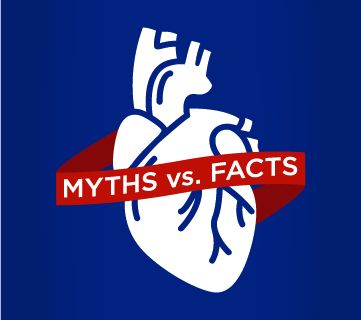Busting Heart-Health Myths

Heart disease, or any cardiovascular disease, is a condition that affects the structure and function of your heart. You might already know that these diseases are common and quite serious, but with so much information out there, how can you tell what’s fact and what’s fiction? We’re here to bust the most popular heart-health myths.
Myth: Heart disease is a “man’s disease.”
Fact: Heart disease is the leading cause of death for both men and women in the U.S. It causes more deaths than Alzheimer’s, all cancers, chronic respiratory disease and accidents combined. The number of women with heart disease is also on the rise, causing the deaths of 1 in 3 women.
Myth: Heart disease symptoms are the same for both men and women.
Fact: While the most common symptoms are the same for men and women, including chest pain, chest pressure when exercising and shortness of breath, women are more likely to experience uncommon symptoms. This includes nausea, vomiting, extreme fatigue and breaking out in a cold sweat. All of these symptoms should always be taken seriously.
Myth: There aren’t any tests to detect heart disease.
Fact: There are actually multiple tests that can detect heart disease. The first step is to see your doctor for a checkup. They’ll talk to you about any risk factors, including smoking, high blood pressure, type 2 diabetes, high cholesterol and family history. If heart disease is in your family, you may be asked to undergo a radiologic test that detects calcium in the arteries surrounding the heart.
Myth: Heart failure means your heart has stopped beating.
Fact: Heart failure doesn’t mean your heart has stopped beating. Heart failure occurs when the heart muscles (or valves) have been damaged and the heart isn’t able to pump blood through the body as well as it should.
Myth: Heart failure is a normal part of getting old.
Fact: While most people who have heart failure are elderly, it can affect people of all ages. It’s a serious cardiovascular condition that can often be prevented and helped with treatment and lifestyle changes. This includes getting active, stopping smoking, managing your weight and following a healthy diet. Managing your blood pressure is also important, as uncontrolled high blood pressure can increase your risk for heart attack, heart failure and stroke. Our Hypertension Management Program offers support and resources to help you manage your blood pressure numbers at home, including a free blood pressure monitor.
Myth: There’s no connection between menopause and heart disease.
Fact: Research has shown that about 10 years after menopause, there’s an increase in cardiac events in women. While the reasons aren’t clear yet, it’s thought to be related to decreases in estrogen and other factors like increases in blood pressure and changes to the ratio of “good” and “bad” cholesterol.
Myth: Eliminating salt is key to a healthy heart.
Fact: Many people know that sodium, or salt, can increase your risk for high blood pressure and heart disease. But eliminating sodium completely from your diet is not good for your health. Your body needs the right amount of sodium to actually help control blood pressure and make the nerves and muscles work properly.
Myth: I don’t add salt to my food, so I don’t eat too much sodium.
Fact: More than 75% of Americans consume too much sodium, and most of it comes from processed foods, not the salt shaker. Poultry, cheese and bread can also have excess sodium. And some over-the-counter medications contain high levels of sodium. Always read nutrition labels and drug labels to know exactly how much sodium you’re getting.


